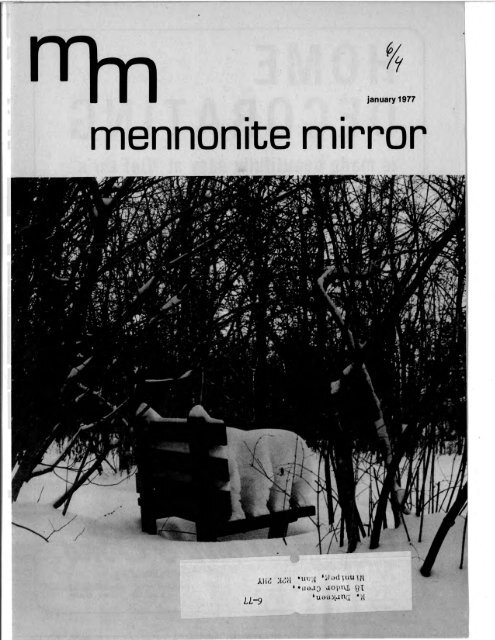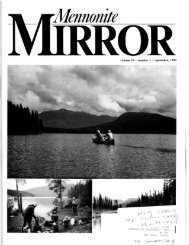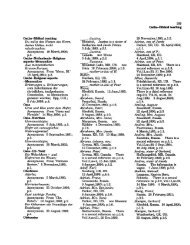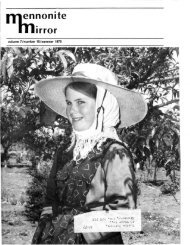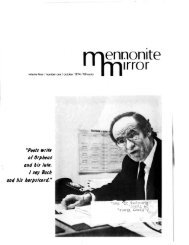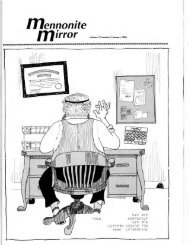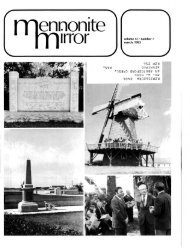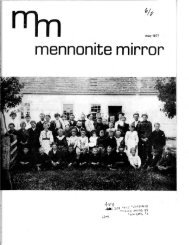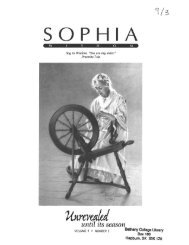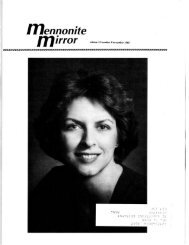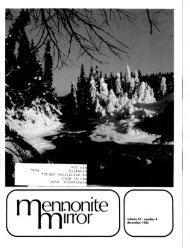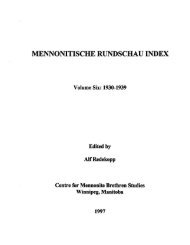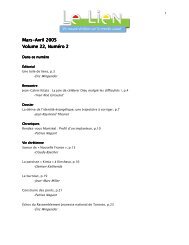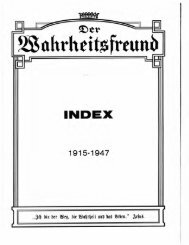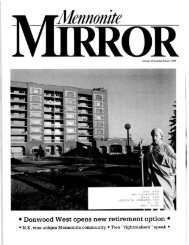No. 4 - Canadian Conference of Mennonite Brethren Churches
No. 4 - Canadian Conference of Mennonite Brethren Churches
No. 4 - Canadian Conference of Mennonite Brethren Churches
You also want an ePaper? Increase the reach of your titles
YUMPU automatically turns print PDFs into web optimized ePapers that Google loves.
,t<br />
HOME<br />
DECORATING<br />
is made beautifully easy at "DeFehr's"<br />
.-<br />
• Come In and see our fine<br />
displays and take advantage<br />
<strong>of</strong> our low prices.<br />
• Furniture & Furnishings<br />
• Major & Small Appliances<br />
• Stereo & Television Sets<br />
• Power Garden Equipment<br />
• Farm & Household Supplies<br />
• Plumbing & Heating Equipment<br />
You'll Do Better at "DeFehr's"l<br />
Come in and see our fine displays and take advantage <strong>of</strong> our low<br />
prices. You'll Do Better at "DeFehr's"!<br />
(C. A. DE-FEHR FURNITURE & APPLIANCES)<br />
WINNIPEG, MAN. REGINA, SASK. SASKATOON, SASK. CALGARY, ALTA. EDMONTON, ALTA.<br />
78 Prince •• St. 1202 O.ler St. 281 • 1.t Ave. N. 402 • 11th Ave. SE 10970 • 84th St.<br />
21 mennonite mlr{Or 1 January 1977 '<br />
';<br />
i
R43<br />
41 mennon"_ m Irror 1 January 1977<br />
h t.t t.k ••<br />
W.· ... I'ot w ·ou .... Kot<br />
to t.ll. _h.t .,
Dr. Victor Peters, pr<strong>of</strong>essor <strong>of</strong> history at Moorhead State<br />
University In Moorhead, Minnesota, is well·known among Men·<br />
nonites. He has taught In schools In southern Manitoba, and<br />
has edited and written several books, including authoritative<br />
histories <strong>of</strong> the Hutterltes and Nestor Machno. His Low Ger·<br />
man broadcasts In the 1960's and his earlier editing <strong>of</strong> the<br />
magazine Mennonlt/sche Welt (<strong>Mennonite</strong> World) have won<br />
him a large reading and listening public. For several years he<br />
was principal <strong>of</strong> Westgate <strong>Mennonite</strong> Collegiate In Winnipeg.<br />
Recently Dr. Peters was prompted to write down some<br />
recollection <strong>of</strong> his first decades in this coootry. He was par·<br />
ticularly interested In exploring through his own experiences<br />
the wayan immigrant to a new country adjusts to the new<br />
social and political conditions. For this reason he has titled his<br />
_manuscript, The Immigrant. The <strong>Mennonite</strong> Mirror requested,<br />
and received, permission to publish excerpts from this<br />
ma,nuscript. The immigrant: Part One<br />
Memory <strong>of</strong> Titanic shadows<br />
Winnipeg-bound immigrants<br />
by Victor Peters<br />
We arrived in Winnipeg in late May<br />
1928. The "we" consisted <strong>of</strong> a family <strong>of</strong><br />
three, my mother, my younger brother<br />
and me. Behind us lay Russia and the<br />
Atlantic, which we had crossed on the<br />
antiquated <strong>Canadian</strong> Pacific liner<br />
Marloch. We were told that it was the<br />
last voyage <strong>of</strong> that ship, and believed it.<br />
Later I was to discover that immigrants<br />
who had arrived in Canada before and<br />
after us had been told the same thing.<br />
Only recently I wrote to CPR public<br />
relations inquiring about the fate <strong>of</strong> the<br />
Marloch. The information that I received<br />
was interesting enough. The 10,000 ton<br />
ship had taken to water in 1905, named<br />
Victorian. Before its name was chCllJged<br />
to Marloch it had been temporarily in<br />
"Indian troopipg service," to use the<br />
language <strong>of</strong> the ship's record. In 1929,<br />
according to these annals, the Marloch<br />
"arrived at Milford Haven, and broken up<br />
subsequently at Pembroke Dock." I am<br />
sure it had more than earned its demise.<br />
The ocean voyage had been pleasant<br />
enough. It wasnot the CPR policy to ply<br />
half-empty ships across the wide sea,<br />
and our boat was filled with immigrants<br />
from bow to stern. Since we were a family<br />
<strong>of</strong> t'hree and I was 12 and my brother<br />
eight, a fourth passenger was assigned<br />
to our small fourberth cabin. It was a<br />
thin, devout, young German woman not<br />
out for adventure or fame or fortune, but<br />
rather to work in a household in some<br />
<strong>Canadian</strong> city. She already regretted having<br />
left home, for she got sea-sick shortly<br />
after we left Southampton and did not<br />
leave the cabin until we reached Quebec.<br />
During the entire voyage the rosary never<br />
left her hands. She was firmly convinced<br />
that we would never touch land again ex-<br />
cept sea-bottom. When she learned that<br />
my brother and I were not baptized the<br />
beads slid even faster through her fingers,<br />
convinced that God's patience was<br />
at an end, his wrath indeed overdue. Her<br />
fears were not entirely unfounded.<br />
For four days our ship lay motionless in<br />
the <strong>No</strong>rth Atlantic as the icebergs that<br />
floated majestically down the Labrador<br />
Current enveloped us in mist and fog.<br />
The fog-hom's eery and muffled Signal<br />
warned all ships to take heed <strong>of</strong> our<br />
presence. When at noon the fog would<br />
lift for an hour we couid see the icebergs<br />
in the not-too-great distance. We stood<br />
at the railing fascinated by the spectacle<br />
<strong>of</strong> floating, shifting and sliding <strong>of</strong> icemasses<br />
while older people behind us on<br />
deck-chairs and wrapped in warm blankets<br />
recalled how they had read in newspapers<br />
about the sinking <strong>of</strong> the Titanic. I<br />
assured my brother that if we sank our<br />
losses would be less than that <strong>of</strong> the<br />
Titanic for the Marloch did not have<br />
1,500 people on board. History was my<br />
favorite subject. in school even in Russia<br />
and my mother WOUld . sometimes wonder<br />
that I would remember useless<br />
historical facts and forget to wash my<br />
hands for breakfast.<br />
SometimeS' when I think back on that<br />
ocean crossing I will concede that the<br />
. young woman who clutched her rosary<br />
and feared the future had a more realistic<br />
grasp <strong>of</strong> life than I who eagerly looked<br />
forward to that same future, without<br />
benefit <strong>of</strong> the beads.<br />
We landed in Quebec and as the immigrant<br />
possessions, safely packed in<br />
crates and large wicker-boxes, were<br />
unloaded from the boat, the passengers<br />
streamed single-line down the gangplanks.<br />
I was carrying my mother's<br />
guitar. In this as in other ways I was a<br />
disappointment to her. I, true somewhat<br />
unwillingly, was prepared to carry the<br />
delicate instrument, neatly packed in a<br />
shakhol, but I refused to learn to play it.<br />
<strong>No</strong> sooner had I set foot in Canada (it<br />
was not actually <strong>Canadian</strong> soil my feet<br />
touched but a crudely-constructed<br />
boardwalk) when a heavy hand pulled me<br />
out <strong>of</strong> the line. At the same time my<br />
mother and brother were motioned to<br />
follow the others in the direction <strong>of</strong> the<br />
immigration hall. <strong>No</strong> verbal explanation<br />
was given, possibly because the <strong>of</strong>ficials<br />
spoke no other language than English,<br />
and when I rejoined them a few hours<br />
later they were visibly relieved. They had<br />
half-suspected that I had already been<br />
deported back to Russia.<br />
At that time <strong>Canadian</strong> immigration laws<br />
refused entry into Canada to all immigrants<br />
physically or mentally ill or<br />
handicapped. In Russia I had trachoma,<br />
a contagious eye-disease. A Jewish<br />
oculist in Saporozhye had removed the<br />
trachoma by "skinning" the inside <strong>of</strong> my<br />
eye-lids, a painful operation especially<br />
as at that time anaesthetics were not<br />
readily available in Russia. A note to the<br />
effect that I had had trachoma had been<br />
entered into my health record. It was for<br />
this reason that I was segregated from<br />
the other immigrants and escorted to ,a<br />
medical centre. Fortunately the eyeoperation<br />
had been a complete success<br />
and I was permitted to rejOin my family.<br />
If it had been otherwise I would have<br />
been sent back on the next boat. An acquaintance<br />
<strong>of</strong> mine who is now in<br />
Canada was seht back three times for<br />
minor reasons. He spent the years between<br />
his ocean trips in refugee camps<br />
in Europe.<br />
Under the protective custody <strong>of</strong> the<br />
CPR we were herded to one <strong>of</strong> their<br />
transcontinental trains and began the<br />
long Journey westwards. <strong>No</strong> food was<br />
provided and as the passengers grew<br />
hungry the more venturesome among<br />
them left the train to ferret for food in the<br />
straggly settlements around the railway<br />
mennonite mirror 1 January 1977/7
There once was a sportswriter<br />
who got tired <strong>of</strong> prose · · ·<br />
by Rudy Schulz<br />
It Is customary at this time <strong>of</strong> year for<br />
sportswriters to review the past year and<br />
make appropriate awards. The Mirror<br />
sports department has made its own<br />
selections. The selection followed well<br />
established ground rules, similar to<br />
those employed In larger circles. Each<br />
<strong>Mennonite</strong> sportswriter across the country<br />
received one vote. Since there are no<br />
sportswriters for the other <strong>Mennonite</strong><br />
papers, to my knowledge, the voting procedure<br />
was accomplished with dispatch<br />
and unanimity. All winners receive a<br />
momento <strong>of</strong> their award In the form <strong>of</strong> a<br />
limerick. (Needless to say they'll see It<br />
first In the Mirror.)<br />
The first Mirror award is the Bitter Pill<br />
Trophy which goes to place kicker Bernie<br />
Ru<strong>of</strong>f <strong>of</strong> the Winnipeg Blue Bombers.<br />
One Ru<strong>of</strong>f, a kicker <strong>of</strong> note,<br />
Won the title for scoring, by rote.<br />
But to his dismay,<br />
One kick went astray,<br />
And the season for Bombers was Tod.<br />
Still In football, the next award goes to<br />
coach Bud Riley, also <strong>of</strong> the Bombers.<br />
He wins the Cotton Batten Trophy.<br />
As coach <strong>of</strong> Big Blue, Mr. Riley,<br />
Was deploying his athletes quite slyly,<br />
The Bomberville fans<br />
Sent him jeers from the stands<br />
Till the Bombers began to win fin'lIy.<br />
Westerners were sad when the Saskatchewan<br />
Roughriders lost the Grey Cup<br />
game. To them goes the Lost Script<br />
Plaque.<br />
From the prairies the Giants Green<br />
and Jolly,<br />
Were favoured to win It, by golly,<br />
The cunning Lancaster,<br />
Was early the master,<br />
Till Clements to Gabriel did volley.<br />
The Emotional Outburst <strong>of</strong> the Year<br />
award goes to Bud Grant <strong>of</strong> Minnesota<br />
Vikings. The award Is given for the single<br />
flap <strong>of</strong> his long arms following his<br />
team's narrow win over the L. A. Rams.<br />
There once was a team, call them Viking,<br />
Whose coach had forbidden all spiking.<br />
A display <strong>of</strong> emotion<br />
Wasn't part <strong>of</strong> the potion,<br />
But all for the Great Stoneface were<br />
striking.<br />
Since by the time this issue come to<br />
you Superbowl XI will have come and<br />
gone, we submit an alternate engraving<br />
should the Vikings prevail over the<br />
Oakland Riders . .<br />
There once was a coacher named<br />
, Grant<br />
Who always maintained his coolant.<br />
The Vikings, all sound,<br />
Have been Super Bowl bound,<br />
Leaving Oakland their loss to repant.<br />
<strong>No</strong>w to our hockey awards. Coach Bobby<br />
Kromm had his moments In 1976. His<br />
Jets won the Avco Cup, then he helped<br />
Wishing oll'oul clients and fllends<br />
a joyous and plospelous New Yeol<br />
if4Zt)(J(ftou. SYNDICATE LIMITED<br />
We can find a way<br />
to get your future going today<br />
.<br />
Bowman and Company as coach <strong>of</strong><br />
Team Canada. Then came a spat <strong>of</strong> Injuries<br />
and the trip to Moscow. Mr.<br />
Krumm receives the "How Swede it<br />
Was" award.<br />
A coach <strong>of</strong> distinction was Kromm,<br />
A cup called the AVCO he won,<br />
Though injuries test ya,<br />
Still on to Isvestia,<br />
Letting fly here and there with a bomb.<br />
The Shortest Memory <strong>of</strong> the Year award<br />
goes to Allan Eagleson for his comments<br />
about the Winnipeg Jets' participation<br />
in the Isvestia Tournament.<br />
There once was an agent called Eagle,<br />
Didn't know how we felt at "Der<br />
Speigel" .<br />
How soon he forgot,<br />
The Team Canada Plot,<br />
Hadn't always been winningly regal.<br />
The next award is the Golden Dove<br />
Trophy and the winner Is Bobby Hull. The<br />
trophy features a flying dove with a<br />
broken wing emblazoned on Gold with<br />
broken hockey sticks, and a hatchet pendant,<br />
carrying, symbolically, the two<br />
crests, that <strong>of</strong> the WHA and the Winnipeg<br />
Jets, on the dove's shoulders.<br />
The Golden Jet, let it be known,<br />
Thinks hatchet men are violence<br />
prone.<br />
"The League, "he said,<br />
"will soon be dead,<br />
Let's records break, not skin and<br />
bone."<br />
The Optimist <strong>of</strong> the Year award goes to<br />
AI Golden who proposed a scheme to<br />
build a large sports complex without taxbase<br />
support.<br />
One Golden, an entrepeneur,<br />
An arena for us did conjure,<br />
<strong>No</strong> taxes on dwellings,<br />
Just membership shellings,<br />
To people their bread for to lure.<br />
The <strong>Mennonite</strong> Mirror sports department<br />
announces its Trilingual Umerick<br />
competition. Send, or phone In, ' your<br />
limericks by the 15th <strong>of</strong> each month.<br />
Each month the winning submission will<br />
receive a $5 prize. Call collect 1 - 204 -<br />
334-6106. limericks will be judged for<br />
originality, sports content, · and ethnolinguistic<br />
imagery. The decision <strong>of</strong> the<br />
judges will be final. mm<br />
mennonite mirror 1 January 1977/11
in Vancouver, Winnipeg, Toronto, Montreal,<br />
Ottawa und Halifax bezogen<br />
werden.<br />
IN OEM KANAOISCHEN MUSEUM<br />
FUER VOLKERKUNOE (NATIONAL<br />
MUSEUM OF MAN)<br />
Das kanadische Museum fuer<br />
Voelkderkunde in Ottawa haelt die<br />
Geschichte der volklich-kulturellen<br />
Traditionen aller Kanadier dokumentarisch<br />
fest. Das Museum hat eine Unzahl<br />
von Gegenstaenden, Tonbaedern,<br />
Filmkassetten und Filmen angesammelt.<br />
Dabei wurde der Akzent auf<br />
Volksarchitektur, Hausrat, vorindustrielle<br />
Werkzeuge zur Herstellung<br />
von Nahrungsmitteln und kunstgewerblichen<br />
Arbeiten, ueberlieferte Erzaehlungen,<br />
Familien- und Gemeinschaftsleben,<br />
Feste und rituelle<br />
Gebraeuche gelegt. Darueber hinaus<br />
sind Ausstellungen und Wanderschaustellungen<br />
in Vorbereitung.<br />
1M STAATSARCHIV (PUBLIC AR·<br />
CHIVES)<br />
Die Arbeit des kanadischen ethnischen<br />
Archives ist darauf ausgerichtet,<br />
volklich-kulturelle Aufzeichnungen aufzuspueren<br />
und vor Verlust, Beschaedigung<br />
oder Vernichtung zu bewahren.<br />
Ein Stab von Spezialisten fuer die<br />
einzelnen Gebiete hat begonnen, durch<br />
Fuehlungnahme mit volklich-kulturellen<br />
Organisationen, Vereinigungen oder<br />
Einzelpersonen Aufzeichnungen dieses<br />
reichen und wichtigen Teils unseres<br />
Erbes zusammenzutragen.<br />
1+1 Hon.<br />
John Munro L'hon. John Munro<br />
Minister Responsible Ministre charge<br />
for Multiculturalism du multiculturalisme<br />
IN DER KANADISCHEN STAATS·<br />
BIBLIOTHEK (NATIONAL LIBRARY)<br />
Die kanadische Staatsbibliothek hat<br />
einen vielsprachigen Buchdienst<br />
eingerichtet. Sein Ziel ist es, Buecher in<br />
solchen Sprachen zu sammeln, die in<br />
Kanada gesprochen werden, aber nicht<br />
zu den Amtssprachen gehoeren. Sie<br />
sollen bei Volksbuechereien ausgeliehen<br />
werden und deren Buchsammlungen<br />
in nichtamtlichen Sprachen<br />
vermehren. Die erste Sendung . von<br />
Buechern in zehn verschiedenen<br />
Sprachen hat Ottawa im Maerz 1975<br />
verlassen. Fuenf neue Sprachen sollen<br />
planungsgemaess jaehrlich hinzukommen,<br />
bis insgesamt 70 Sprachen erreicht<br />
worden sind.<br />
Wenn Sie Ihre Meinung aeussern oder<br />
weitere Informationen erhalten wollen,<br />
schreiben Sie bitte an:<br />
Multiculturalism, 16th Floor, 66 Slater Street,<br />
Ottawa, Ontario, K1A OMS<br />
mennonite mirror 1 january 1977 113
A new year and a new start,<br />
Life begins at 401<br />
by Betty Dyck<br />
A new year can herald a new beginning,<br />
depending upon individual desires.<br />
Right now, universities, colleges,<br />
schools and community clubs are<br />
commencing a new round <strong>of</strong> programs in<br />
continuing education, arts and crafts.<br />
If a woman must earn her own liv·<br />
ing there are many technical pursuits<br />
for which she may be<br />
qualified. Lithograph , modeling in<br />
clay or wax, bookkeeping, shorthand,<br />
writing and many other handicrafts<br />
are now con si dered<br />
womanly occupations, and anyone<br />
<strong>of</strong> them is apt to prove <strong>of</strong> more use<br />
to the girl who has her own way to<br />
make than a superficial knowledge<br />
<strong>of</strong> the ologies, languages or music.<br />
If a girl is rich , let her be educated<br />
to the full extent <strong>of</strong> her ability; but<br />
she should also be trained in some<br />
pr<strong>of</strong>ession or paying employment<br />
that she may be independent <strong>of</strong> her<br />
money and the more self respecting<br />
on that account.<br />
Matrimony is not the only harbour<br />
in which she may safely anchor, and<br />
catching a husband is not the chief<br />
end <strong>of</strong> life.<br />
I found this philosophy expressed in an<br />
1884 edition <strong>of</strong> the Winnipeg Daily Sun,<br />
while researching a history project. The<br />
article could have been written today. A<br />
recent quote by Shirley Scaletta, a prominent<br />
Catholic Women's League<br />
worker as stated: " Each woman should<br />
begin with herself, d,Elveloping her insights.<br />
She should the'n introduce other<br />
women to a positive exposure <strong>of</strong><br />
feminism." <strong>No</strong>t only to other women, but<br />
aiso to our daughters, who are growing<br />
up in a world far different from the one<br />
most <strong>of</strong> today's middle-aged mothers experienced.<br />
Our younger generation have<br />
no priorities on modern day advantages.<br />
The best way.to teach is by example.<br />
Married women have it made, no matter<br />
what some misguided libbers may advocate.<br />
Equal pay for equal work is proper,<br />
and the right <strong>of</strong> advancement accompanied<br />
by ability and seniority<br />
should be accorded to working women<br />
competing with men for promotion. Who<br />
wants anything else? I appreciate being<br />
treated like a lady and as a married<br />
woman I possess some prime privileges.<br />
Long before most husbands, wives<br />
reach an executive level <strong>of</strong> existence<br />
whereby their work hours are reduced,<br />
liberating them to participate in activites<br />
outside the home. We already enjoy a<br />
guaranteed income (our husband's<br />
salary) which allows us to do our own<br />
thing. For us, life really does begin at 40.<br />
After 20 years <strong>of</strong> being a homemaker, we<br />
can change occupations without fear <strong>of</strong><br />
forfeiting fringe benefits accumulated<br />
during our previous employment.<br />
Men, on the other hand, find it difficult<br />
at 40 to switch occupations even though<br />
they might desire to do so. According to<br />
an article by Melvin Maddock, men encounter<br />
the "mid-career blahs" when<br />
they reach middle age. Many are then<br />
engaged in jobs which fail to excite them<br />
and they have another uninteresting 20<br />
'orttempo 1abncs<br />
Winnipeg's Exclusive Stretch Sewing Centre<br />
1600 Portage Ave. - Across from Polo Park<br />
Ph. 775-2548<br />
I<br />
years to look forward to. A minority take<br />
stock and switch to something else, but<br />
since men are. primarily family financeers<br />
utilizing their regular cheques to<br />
meet mortgage payments and guarantee<br />
a proper pension plan, most <strong>of</strong> them cannot<br />
afford a change. They are locked in.<br />
Conversely, when women reach 40,<br />
even though many are n<strong>of</strong> especially<br />
anxious to abort their role <strong>of</strong><br />
homemaker, they can enhance it with<br />
some interest which has taken a back<br />
seat or embark on a new course. They<br />
can re-enter the work force and begin to<br />
mingle with their peers, pursue a hobby<br />
full time or return to studies. Schools,<br />
colleges and universities across Canada<br />
have become increasingly aware <strong>of</strong> their<br />
responsibility to assist adults in appreCiating<br />
the advantages <strong>of</strong> a leisureoriented<br />
society. Classes are being <strong>of</strong>fered<br />
in innumerable subjects and crafts<br />
so every person has a chance to choose<br />
one that appeals to his or her particular<br />
paSSion.<br />
In Winnipeg, the University <strong>of</strong> Winnipeg<br />
has its U at Two - classes two afternoons<br />
a week from 2:00 to 3:30 p.m. (and also<br />
from 9:00 to 11:30 a.m.). <strong>No</strong>w mothers do<br />
not even have to walt until <strong>of</strong>fspring are<br />
grown up. If women wish to take these<br />
classes, they can be home at lunch and<br />
back again by the time children return<br />
from school. The 1 V2 hour absence from<br />
home disrupts no one's daily schedule<br />
but the mother's. It does not eat into her<br />
evenings and permits her to continue<br />
with community commitments, entertainment<br />
and family-snaring acitivities.<br />
My return to the halls <strong>of</strong> learning via U<br />
at Two proved to be a rich and rewarding<br />
experience. The challenge <strong>of</strong> the course,<br />
the intellectual class discussions, the<br />
discipline <strong>of</strong> reading a book intelligently,<br />
<strong>of</strong> tackling an essay in all its concise and<br />
factual form with the necessary research,<br />
and the amazing discovery <strong>of</strong><br />
finding your brain is alive and well after<br />
25 years away from school - these are incentives<br />
enough, The bonus is that you<br />
become an enlightened companion, attuned<br />
to the world and able to engage in<br />
a viable communication with your husband<br />
and others who are, <strong>of</strong> necessity, in<br />
the working world coping with universal<br />
situations.<br />
The married man may well find himself<br />
in an uninteresting job at age 40 with 20<br />
more unchallenging years ahead <strong>of</strong> him,<br />
but the married woman is in. an enviable<br />
position at this time - not trapped by any<br />
. housewives' syndrome as some libbers<br />
would have you believe. Many choices<br />
are available to enhance your coming-<strong>of</strong>age,<br />
Beauty is in the eye <strong>of</strong> the beholder <br />
so is opportunity! Help your daughters<br />
realize that life <strong>of</strong>fers not only unlimited<br />
but also continuous choices. Pull your<br />
head out <strong>of</strong> the sand (or the kitchen sink)<br />
and explore what is available. Take advantage<br />
now <strong>of</strong> the privileges possessed<br />
by the married woman to charter an exciting<br />
course forthe future. mm<br />
mennonite mirror I january 1977 115
Taeters nicht ken nt, von dem man aber<br />
elne Beschreibung besltzt. Es wurden<br />
und werden Photos der Kinder auf<br />
Plakaten, in Zeitungen und Zeitschrlften<br />
veroeffentlicht mit ausfuehrlicher<br />
Beschreibung der bekannten Daten und<br />
Umstaede beim Auffinden. Besondere<br />
Merkmale am Koerper des Klndes gibt<br />
man jedoch nicht bekannt. Diese so "en<br />
von Eltern selbst angegeben werden, die<br />
meinen, ihr Kind entdeckt zu haben.<br />
Um das elternlose Kind spaeter<br />
moeglichst genau beschreiben zu<br />
koennen, wurden anfangs auf besonderen<br />
Formularen alie Angaben<br />
ueber Fundort, Fundzelt, ueber die<br />
Kleidung des Kindes, ueber sein<br />
Aussehen, ueber die vie"elcht ganz<br />
wenigen Woerter, die das Kleinklnd<br />
sprach, ueber koerperliche Besonderheiten<br />
unc;1 a"es noch Irgendwie Bemerkenswerte<br />
festgehalten, was spaeter<br />
zur Identifizierung des Kindes beltragen<br />
solite. Wie im Kriminalfali nicht selten<br />
eine ganz geringfuegige Nebensache -<br />
zum Beispiel ein am Tatort zurueckgelassener<br />
Gegenstand - zur ErmittlunQ<br />
des Taeters fuehrt, ebenso kann bei der<br />
Personenermittlung, Jahre oder Jahrzehnte<br />
nach der Trennung von den<br />
Eltern, eine Kleinigkelt, die damals jemand<br />
ueber das gefundene Kind niedergeschrieben<br />
hatte, die Loesung bringen,<br />
in welche Familie der Findling von 1945<br />
gehoert.<br />
Wie der Kindersuchdienst nun im<br />
einzelnen bei seiner Arbelt an den vie len<br />
tausend Faelien vorging, sei hier in alier<br />
Kuerze berichtet. Jedes Findelkind<br />
wurde in einer Vielzahl von Spezlalkarteien<br />
erfasst. Da gibt es die Verlustorte-Kartei,<br />
wo die verlustig<br />
gegangenen Kinder nach Ort und Zeit<br />
des Verlustes auf einer Kartelkarte<br />
vermerkt sind. Oem entsprlcht eine fundortkartei,<br />
wo in gleicher Weise die Findlinge<br />
auf einer Karteikarte einzeln notiert<br />
sind. Daneben gibt es Vornamen - und<br />
Kosenamen - Karteien, Geschwlsterkarteien<br />
und 'Sartein, wo die koerperlichen<br />
Merkmale genau beschreiben<br />
werden die von den Eltern angegeben<br />
wurden.<br />
In dieser Vielzahl von Karteien - nur<br />
einige waren hier genannt - kommt es<br />
nun zu 'Begegnungen', belsplelsweise<br />
deckt sich der Inhalt einer Karte der<br />
. Verlustortekartei mit einer Karte der<br />
Fundortekartei. Das koennte nun bedeuten,<br />
dass der Findling, Sohn oder<br />
Tochter, zu den suchenden Eltern<br />
gehoeren koennte. Also wird dleser Fali<br />
daraufhin weiter untersucht. Man<br />
vertleicht jetzt weiter und stellt<br />
vielieicht fest, dass die Eltern elnen<br />
besonderen Kosenamen des Klndes<br />
angegeben haten und das Kind auch<br />
diesen gesprochen hat, wie auf dem Formular<br />
des Finders notiert stand und so<br />
auf einer Karte der Kosenamen-Kartei<br />
festgehalten wurde. Oder die Beschreibung<br />
der Kleidung des Kindes belm<br />
Verlust stlmmt mit den Angaben suchungen fuehren zu dem positiven<br />
ueberein, die ueber die Bekleldung des Ergebnis, dass mit hoher oder hoechster<br />
gefundenen Klndes gemacht worden Wahrscheinlichkeit der Kindersuch<br />
sind. Wenn nun noch in der Verlustkarte dlenst die leiblichen Eltern ermit.telt hat.<br />
das glelche koerperliche Markmal eln Zu a" den Massnahmen zur Idengetragen<br />
i"st wie In der Fundkartel, so tlflzlerung kommt als weiteres wichtiges<br />
kann dies bedeuten, dass der Fa" Hilfsmlttel die gruendliche Befragung<br />
gluecklich geloest 1st, denn so viele a"er bekannt werdenden Personen, die<br />
Ueberelnstlmmungen machen sehr vle"elcht ueber die Herkunft eine Kindes<br />
wahrschelnlich, das gesuchte Kind er oder ueber den Verblelb dar leiblichen<br />
mlttelt zu haben. Trotzdem muss der Eltem Auskunft geben koennten. Eine<br />
Klndersuchdlenst bel seinen end Mi"lonenzahl von Verzelchnet und ergueltigen<br />
Entscheidungen aeusserst moeglichen Befragungen von Pfarrern,<br />
vorsichtlg seln und sich auf jede nur Buergermelstern, Gemelndeschwestern,<br />
moegliche Weise vergewissern, dass er Standesbeamten, Brieftraegern und<br />
rlchtlg entscheldet.<br />
sonstigen Personan, die als Wissen<br />
Darum wlrd der Fa Ii zur letzten straeger im Einzelfali angesprochen<br />
Beurteilung noch wissenschaftlichen werden koennen.<br />
Untersuchungen ueberlassen. Da gibt es So entstehen durch den umfangreichen<br />
den anthropologischen Bildverglelch, Schrlftwechsel - einer verweist wieder<br />
der zumeist von Unlversltaetslnstituten auf elnen andern, der vle"eicht dazu etvorgenommen<br />
wird, wo dann Bilder des 'was aussagen koennte - der Jahr fuer<br />
jungen Menschen, moeglichst in ver . Jahr gefuehrt werden muss, dicke Akten,<br />
schiedenen Altersstufen, mit Bildern ehe ein Fali erfolgreich abgeschlossen<br />
der Eltern und wenn vorhanden auch der werden kann. Und erst, wenn aIle nur<br />
Geschwister miteinander verglichen moeglichen Ueberpruefungen - vorge<br />
werden, um herauszufinden, ob hler elne nommen sind und positiv ausfa"en, er<br />
leibliche Abstammung bestehen kann fahren die Angehoerigen und der bisher<br />
oder nicht.<br />
als 'Findling' lebende Mann oder Frau<br />
Eine weitere sehr wichtige wissen das Ergebnls, damit keine vorschne"en<br />
schaftlich Ueberpruefung besteht aus Erwartungen am Ende zunichte werden.<br />
der Festste"ung der Blutgruppen von Diese Enttaeuschung waere grausam.<br />
Kind und vermeintllchen . Eltern und Wle steht es nun mit der Erfolgen, je<br />
deren Vergleich. Da wlrd das Blut nach weiter das Geschehen des Krieges<br />
mehr als elnem Dutzend verschiedenen zurueckliegt? Das ist eine haeufig<br />
Merkmalen untersucht und miteinander geste"te Frage. Die Kinder seien doch<br />
verglichen. Heute gibt es in Deutschland heute erwachsena Maenner und Frauen,<br />
schon ein Universitaetsinstitut, wo ein selbst schon in vlelen Fae"en Vater und<br />
Computer, in der die Blutdaten einge Mutter geworden. Der Wunsch, die eigeben<br />
werden, angibt, wie hoch die gene Herkunft geklaert zu wissen, wird<br />
Wahrschelnlichkeit 1st, dass die Eltern mit der Alter eher staerker, so ist die Erschaft<br />
zum Kind vorliegt. Gesagt muss fahrung. Waehrend einerseits die Nach<br />
dabel werden, dass die Oststaaten in forschung immer schwierlger wird, weil<br />
gleicher Weise behilflich sind, solche die Generation stirbt, die bei der<br />
Untersuchungen durchzufuehren, wenn Nachforschung helfen kann, wird die In<br />
der Junge Mensch slch noch dort be- . dentlflzierung bisweilen leichter, weil<br />
findet. Dort wle hier werden diese sehr der aelter werdende Mensch <strong>of</strong>t immer<br />
aufwendigen Untersuchungen unent staerker In die Familienaehnlichkeit hingeltlich<br />
von den Instituten durcheinwaechst.gefuehrt, was auch nicht unerwaehnt <strong>No</strong>ch sind etwa 6000 Fae"e beim<br />
blelben soli.<br />
Kindersuchdlenst ungeloest, davon et<br />
Die Untersuchungen koennen ergeben, was ueber ein Viertel von diesen<br />
dass der Vergleich negativ ausfae"t, was 'Namelose'. Man kann nur h<strong>of</strong>fen und<br />
bedeutet, dass die Annahme, die rich wuenschen, dass noch recht vlelen zu<br />
tigen Angehoerigigen gefunden zu ihrer Identitaet und zu ihren Ange<br />
haben, leider nlcht zutrifft oder die Unterhoerlgen verholfen werden kann. mm<br />
·,For all your home-sewing needs<br />
REMNANTS<br />
B the Pound<br />
PATTERNS<br />
mennonite mirror 1 january 1977/19
our word.<br />
Recapturing the Elusive Spirit <strong>of</strong> Christmas<br />
We all have dreams about how things ought to be in this world,<br />
and we also have some awareness <strong>of</strong> how things really are. The<br />
gap between the dream and the reality haunts us. The more<br />
sensitive we are the more likely we are to be disturbed by it.<br />
The gap between vision and reality is perhaps most apparent<br />
at Christmas. What has all the buying and selling, the baking<br />
and eating to do with the story <strong>of</strong> the Christchlld? Obviously<br />
not much. So here is a read9 made cause for all those who are<br />
haunted by the vast gulf that separates the real from the ideal.<br />
So what can we do about it? This past Christmas season had<br />
its usual fill <strong>of</strong> sermons on the subjects, plus some ingenious<br />
new ideas. The most imaginative allempt to close the gap and<br />
to put "Christ back in Christmas" was the Nativity Parade held<br />
in Winnipeg oli the Sunday before Christmas. We watched part<br />
<strong>of</strong> it on television. We have friends whose children were<br />
delighted by the parade, and others who were moved to tears<br />
by the service held at the Winnipeg Convention Centre. We are<br />
grateful that some <strong>of</strong> the longing <strong>of</strong> these friends for a sense <strong>of</strong><br />
joy and simple reverence was satisfied by this experience. But<br />
what are these feelings that we are trying to capture? And how<br />
important are they? '<br />
<strong>No</strong>w that Christmas is over it might be useful to explore some<br />
<strong>of</strong> these questions.<br />
What is it that we should " feel " at Christmas? Joy, peace, a<br />
deep sense <strong>of</strong> kinship with the person <strong>of</strong> Jesus? These are un·<br />
doubtedly the feelings that most <strong>of</strong> us would like to have and<br />
that we identify with the " true" Spirit <strong>of</strong> Christmas. How does<br />
one capture such feelings, and how important are they for the<br />
Christian life? These are much more difficult questions to<br />
answer.<br />
A true feeling for Christmas may elude us for a host <strong>of</strong><br />
reasons, some much more obvious than others. The obvious<br />
reasons are the ones usually cited: the excessive commer·<br />
cialism <strong>of</strong> the Christmas season, the numerous housekeeping<br />
and business duties which we have come to accept if for no<br />
better reason than from sheer habit. For many such external<br />
reasons (Including, perhaps, an excessive number <strong>of</strong> church<br />
progams) the Christmas season may be the least peaceful time<br />
<strong>of</strong> the year for some <strong>of</strong> us. But there may be more subtle<br />
reasons why the feelings that we so much desire <strong>of</strong>ten escape<br />
us. One is surely the fact that feelings and emotions by their<br />
very nature cannot be pursued and captured at will. We are<br />
most <strong>of</strong>ten, as C. S. Lewis has said so well, "surprised by joy".<br />
You cannot hold a moonbeam in your hand, and you cannot<br />
create conditions which will guarantee deep feelings <strong>of</strong> peace<br />
and reverence. You can "will" to love a person, but you cannot<br />
willy nilly " create" the emotions which sometimes accompany<br />
love· and sometimes don't. It may be that some <strong>of</strong> the things<br />
we organize to create a sense <strong>of</strong> worship, for example, actually<br />
" work". If.they never did there would be little point to most <strong>of</strong><br />
our human endeavour. The Nativity Parade had the aesired ef·<br />
fect for some people. One <strong>of</strong> the carols sung at our Christmas<br />
eve candle service moved us sincerely. We can recall a simple<br />
rendition <strong>of</strong> Bach's St. John's Passion a few years ago which<br />
convinced us, as perhaps no other single experience ever has,<br />
<strong>of</strong> the abiding presence <strong>of</strong> God in our lives. These things can<br />
happen . and thank God they do . but there is never any<br />
guarantee that a particular event will have the desired effect.<br />
We should be deeply grateful for those moments when we are<br />
surprised by joy, but we shouldn't be too concerned when a<br />
certain desired feeling eludes us - even if it is the spirit <strong>of</strong><br />
Christmas. Because what is the spirit <strong>of</strong> Christmas? What does<br />
is mean to put " Christ back into Christmas"? In the end our<br />
feelings may be <strong>of</strong> relatively lillie consequence. True love is<br />
, 221 mennonite mirror 1 january 1977<br />
<strong>of</strong>ten a wonderful combination <strong>of</strong> emotions and actions but<br />
love should always be described essentially in terms <strong>of</strong> actions<br />
rather than emotion. It is much sounder to be concerned about<br />
acting in a loving way toward a person, than It Is to worry<br />
about your feelings. The failure to put the weight In the<br />
right place has led countless persons in our society into deep<br />
trouble. So also, the essential thing about being a Christian,<br />
and about putting Christ back into Christmas, is to act In a<br />
Christan way to those around us. A person who uses the<br />
Christmas season to visit someone who is lonely and rejected,<br />
or quietly shares his possessions with people in need, has cap·<br />
tured the true Christmas spirit whether that person feels it or<br />
not. " By their works you shall know them", not by their emotions!<br />
This may also be something to remember as we contemplate<br />
our essential Christian responsibilities in the New<br />
Year. It is not primarily how you feel , but how you deal, that<br />
concerns God. R_ V_<br />
Strike a blow for yourself,<br />
by developing your own craft<br />
A current radio commericai on CFAM notes that the homemflker<br />
<strong>of</strong> only a few years ago who sewed her own clothing for<br />
her family did so because there wasn 't enough money to buy<br />
them ready-made. The commercial went on to say that this is<br />
no longer true - many people today sew their own clothing in<br />
order to combine quality with economy. In an indirect way, the<br />
commercial implies that it is currently fashionable to sew your<br />
own clothes: where it was once an embarassment to admit that<br />
you did something yourself, it is now a sign <strong>of</strong> status to be able<br />
to demonstrate some level <strong>of</strong> personal craftsmanship.<br />
There are a few reasons to explain the continuance <strong>of</strong> a "do-ityourself"<br />
tradition in a highly specialized and machineoriented<br />
society. One is a wish to save money that would otherwise<br />
go to pay the rather high labor costs incurred if one<br />
employed a tradesperson . A second is that the " do-it-yourself"<br />
approach is perhaps the only way to get something done exactly<br />
to your own specifications and <strong>of</strong> the quality you want.<br />
But there are some less obvious aspects to "doing-it-oneself"<br />
which apply to any amateur undertaking, whether it is as a hobby<br />
or economy measure. The " do-it-yourself" project that is initiated<br />
and completed by an individual (or family unit)<br />
represents one <strong>of</strong> the very few things a person can claim unique<br />
creatorship or ownership to. The vast majority <strong>of</strong> people in<br />
a modern industrial society are employed by someone else,<br />
and, as such, are essentially servants whose time and energy is<br />
to be available more or less on demand to the employer. Accordingly,<br />
there is rather little opportunity to do something on<br />
the job that gives the same sense <strong>of</strong> achievement and satisfaction<br />
as a " do-it-yourself" project.<br />
Another aspect <strong>of</strong> the radio commercial referred to earlier is<br />
the rather disturbing implication that personal craftsmanship<br />
was once considered with disfavor. That is the factory that<br />
turned out hundreds <strong>of</strong> thousands <strong>of</strong> identical stoneware<br />
tableware was inherently superior to the potter who turned out<br />
only a few dozen sets. Indeed, one does not need to look long<br />
or far for newspaper and magazine articles <strong>of</strong> the " humaninterest"<br />
type which feature a person who sOrT1ewhere keeps<br />
alive an ancient craft. Too <strong>of</strong>ten the stOries carry a strong<br />
flavor <strong>of</strong> "good-old-days" nostalgia or present a picture <strong>of</strong> a<br />
King Canute-like character trying to keep back the waves <strong>of</strong><br />
progress. Both attitudes are wrong.<br />
The most important thing about craftsmanship is the personal<br />
touch. Each human being has a personality and, in<br />
greater and lesser degrees <strong>of</strong> ability, is creative. In order for<br />
this creative drive to find expression, the person must find<br />
some outlet for this energy. In the industrial society, these opportunities<br />
must be provided by each person in the form <strong>of</strong><br />
hobbies or other " do-it-yourself" projects. In a small way, then,<br />
the developmemt <strong>of</strong> some level <strong>of</strong> personal craftsmanship in a<br />
technique not related to one's vocation is a way <strong>of</strong><br />
demonstrating the unique personality <strong>of</strong> each human being In<br />
an increasingly impersonal world. ELU
Who then is willing?<br />
• to identify and prepare persons in their congregation<br />
for Christiiln sen 'ice, especially for agricultural, community<br />
development aIle! public health work<br />
• to help children and yo uth cultivate Christlike care for others<br />
and commitment to their biblica l and Anabaptist heritage<br />
• to find wa ys to free family, friends or self to share faith and<br />
skills through church service programs<br />
<strong>Mennonite</strong> Central Committee (Manitoba)<br />
1483 Pem bina High way<br />
Winnipeg, R3T 2C 7<br />
Phone 475- 3550<br />
- ----------
Special Tours<br />
From Assiniboine Travel<br />
Contact<br />
INDIA Feb. 6th· March 7th $2027.50 John Schroeder<br />
MIDDLE EAST March 27 . April 20 $1800.00 John Schroeder<br />
SOUTH AMERICA July 15· Aug. 6 $1760.00 Ruth Wiebe<br />
ORIENT<br />
RUSSIA<br />
July 8· July 31 . $2065.00<br />
July 18· Aug. 10<br />
$2017.00<br />
Charter Flights to Europe<br />
Information on proposed charter flights<br />
to Frankfurt and London<br />
is now available.<br />
Dates and prices subject to change.<br />
Sun Tours<br />
Special One Week Holidays<br />
To ·Mazatlan<br />
and to Freeport, Bahamas<br />
Departures End <strong>of</strong> March, 1977<br />
. Ruth Wiebe<br />
Ruth Wiebe<br />
ASSINIBOINE TRAVEL SERVICE LTD.<br />
219 - 818 - Portage Ave.<br />
Winnipeg, Man.<br />
775·0271


